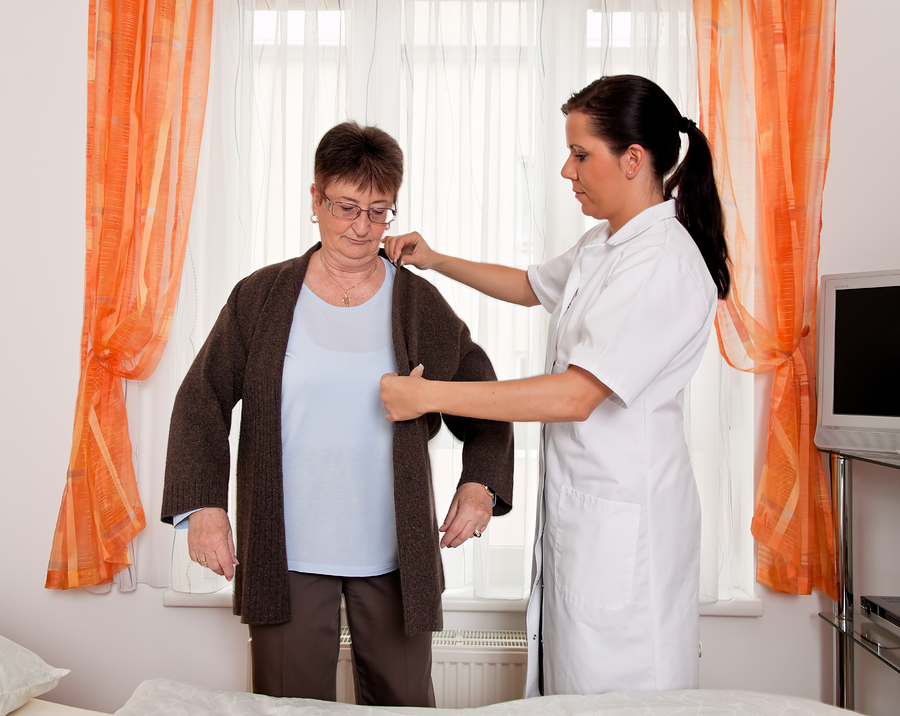
Alzheimer’s disease disrupts a person’s ability to do all sorts of daily activities that were once easy, like getting dressed. The cognitive and physical changes that come with Alzheimer’s disease make it difficult for seniors to make decisions, follow steps in a process, and coordinate their movements. Personal care at home can help with these issues, making it easier for seniors with Alzheimer’s to get dressed and to have the support they need with other tasks, too.
Simplify Choices as Much as Possible
Too many options can make life really difficult for Alzheimer’s patients. This is especially true with things like clothing. Simplifying choices by limiting clothing options is a great way to make getting dressed easier. Offering two options, for instance, rather than asking open-ended questions like, “What do you want to wear today?” is the way to go.
Break Down Tasks
It’s vital to break down tasks into much smaller steps. Simple, step-by-step instructions are easier to follow, especially when someone pauses in between those steps. Home care providers have experience doing this for Alzheimer’s patients, making it easier to assist with tasks like getting dressed.
Use Visual Aids and Cues
Something else that can help is to use visual aids and cues. Pictures, diagrams, charts, and drawings can all be really helpful. Pointing to the visual aids while offering verbal instructions also help. Personal care at home is geared toward using tools like these to help Alzheimer’s patients with daily tasks.
Keep Clothes Comfortable
Comfort is key for Alzheimer’s patients and home care providers understand this. When clothing is comfortable, soft, and easy to put on and take off, seniors are more likely to find it easier to get dressed. This might mean swapping out old garments and outfits for new ones that better fit the seniors’ new needs.
Put a Routine in Place
Establishing routines is really important for seniors with Alzheimer’s disease and personal care at home is able to help. Routines offer support and they feel comfortable for people who have cognitive illnesses like Alzheimer’s disease. Getting dressed at the same time each day and with other established habits before and afterward helps seniors to feel safe.
Offer Gentle Assistance
It’s possible for seniors with Alzheimer’s disease to be physically capable of getting dressed for a long time, but they might need other types of help along the way like gentle reminders of what they’re doing. When and if they do need additional help, it’s best to offer first and to use a calm and reassuring tone. It can be startling for seniors with Alzheimer’s disease to have someone suddenly physically helping them to change clothes, for example.
Keep Distractions to a Minimum
Distractions complicate things for Alzheimer’s patients. The fewer distractions there are, the better. Keeping the environment calm and quiet helps. It also helps to have as little excess noise going on as possible.
Offer Encouragement
Everybody likes a bit of encouragement, and that goes for people who have Alzheimer’s disease, too. A few kind words can go a long way toward helping them to feel motivated and supported. That’s especially true when daily tasks like changing clothes is getting to be difficult on their own.
Dressing is something that is a part of everyday life, but for patients with Alzheimer’s disease, it can be complicated. Personal care at home can help patients and family members understand what’s needed in these situations to offer the right type of help.
The staff at Home Care Matters is available to talk with you and your family about all of your needs. Home Care Matters is a home care agency providing quality and affordable personal care at home in Dacula, GA, and the surrounding areas. Call (770) 965-4004 for more information.
We provide elder care in Braselton, Buford, Dacula, Duluth, Flowery Branch, Gainesville, Johns Creek, Lawrenceville, Oakwood, Sugar Hill, Suwanee, Barrow County, Forsyth County, Gwinnett County, Hall County, Jackson County, North Fulton County.
Valerie has the unique experience with home care as she has experienced it from both ends of the spectrum, as a caregiver and as needing care herself as a cancer survivor. Valerie says, “Taking care of someone you love is a physically, mentally and demanding labor of love.Taking care of my mom was the hardest thing I have ever done. It has given me an insight and perspective not many people understand unless you are doing it or have done it.I loved taking care of my mom.I love helping others take care of their love ones too.And now that I’ve been sick, it’s given me a whole new level of empathy and understanding for those who are sick and need help.”
Valerie’s schedule varies daily, but she loves visiting with our clients, families, caregivers, our network partners and being in the office.Says Valerie, “Every day is different, but I wake up excited about what we do, inspired by our team, clients and caregivers.I strive to be a resource to the community.I love my team and I love what we do every day. I like to think my mom would be proud.”
You can reach Valerie by email (Valerie@homecarematters.com) or in our office (770.965.4004).
- How In-Home Alzheimer’s Care Helps Your Parent Stay Safe and Comfortable - December 26, 2025
- After the Fall: How Home Care Helps Seniors Recover Safely at Home - December 19, 2025
- Supporting Seniors with Memory Challenges Through Compassionate Senior Home Care - December 12, 2025
